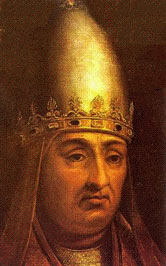“WE ARE COMPELLED, OUR FAITH URGING us, to believe and to hold—and we do firmly believe and simply confess—that there is one holy Catholic and Apostolic Church, outside of which there is neither salvation nor remission of sins”
Unam sanctam ecclesiam catholicam et ipsam apostolicam urgente fide credere cogimur et tenere, nosque hanc frmiter credimus et simpliciter confitemur, extra quam nec salus est, nec remissio peccatorum,
Unam sanctam (1302)
